
You can now view all 85 ME Wishes here.
Myalgic Encephalomyelitis (ME/CFS) is a highly misunderstood illness, and there are many misconceptions surrounding this debilitating condition. So I asked the ME community: “What do you wish people knew about ME?
The following post is a collection of quotes and images from people who live with ME. Please take a few minutes to scroll through them – each wish represents a life devastated by this illness.
What is ME?
I would like to start with a brief introduction to ME.
ME stands for Myalgic Encephalomyelitis – an unpronounceable name for a severely debilitating illness. ME is also known as Chronic Fatigue Syndrome (CFS) but this name, although widely used in the medical profession, is controversial amongst the ME community mainly due to the fact that it perpetuates the myth that ME is just fatigue.
Far from just being tired – ME is a devastating multi-system disease that causes dysfunction of the neurological, immune, endocrine and energy metabolism systems. People with ME experience debilitating pain, fatigue and a range of other symptoms associated with post-exertional malaise (PEM), the body and brain’s inability to recover after expending even small amounts of energy.
ME affects an estimated 30 million people worldwide yet there has been very little funding for biomedical research.
Although the severity of impairment differs greatly from patient to patient, 25% of people with ME are severely affected (housebound or bedbound). And sadly ME, at its most severe, can kill.
The underlying cause of ME is subject to much uncertainty and medical debate, although patients often experience symptoms following a virus or infection. This is one of the reasons why doctors have very differing views on how the condition should be managed, and why we still face so much skepticism and neglect.
There is currently no cure or effective treatment for ME, and patients like myself are often abandoned by the medical profession, and left to fend for ourselves. The lack of disbelief and ignorance surrounding ME is deep-rooted and causes significant harm to patients worldwide.
This must change. This is why we fight so hard to get recognition, to educate, and to raise awareness. We desperately need funding for biomedical research. Our lives depend on it.
If you would like to learn more about Myalgic Encephalomyelitis (ME) please click here.
ME Wishes
I had such an incredible response to this campaign, and I am extremely thankful for everyone who has participated. I am unable to include every quote and image in this post, but I have created a separate post where you can view all 85 ME wishes, and also download them to share.
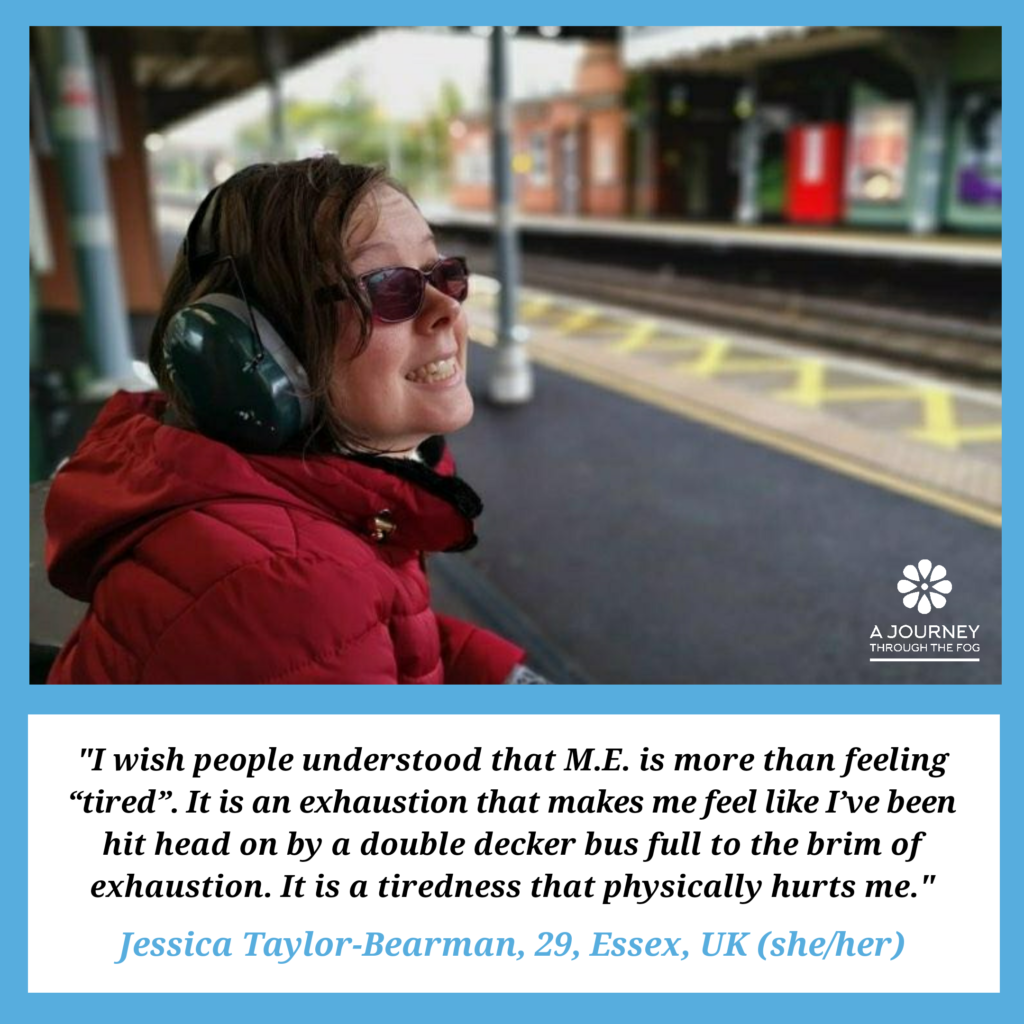
“I wish people understood that M.E. is more than feeling “tired”. It is an exhaustion that makes me feel like I’ve been hit head on by a double decker bus full to the brim of exhaustion. It is a tiredness that physically hurts me.” ~ Jessica Taylor-Bearman (JayTay blog), 29, Essex (she/her)
“ME is hard twofold : it leaves you unable to fight because of physical and neurological symptoms and because of the lack of “proper” biomarkers it gives others the opportunity to question the disease.” ~ Ricardo, 41, Portugal (he/him)

“I wish people knew ME robs you physically, mentally and socially. ME is a prison to my body. 2 years in my bedroom 24/7. NO, I am not depressed, passive or cognitively unable, I’m physically ill.” ~ Mari Ruud, 52, Lampeland, Norway (she/her)
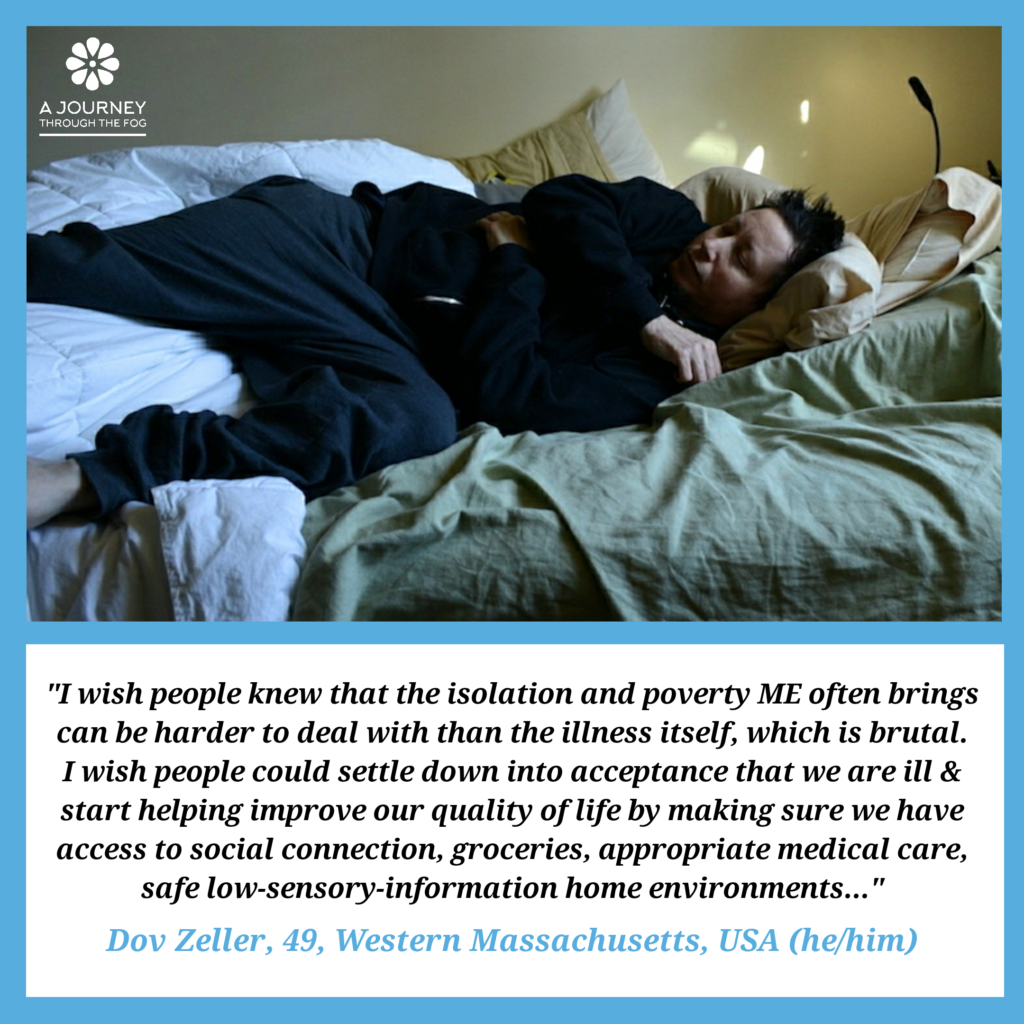
“I wish people knew that the isolation and poverty ME often brings can be harder to deal with than the illness itself, which is brutal. I wish people could settle down into acceptance that we are ill and start helping improve our quality of life by making sure we have access to social connection, groceries, appropriate medical care, safe low-sensory-information home environments…” ~ Dov Zeller, 49, Western Massachusetts (he/him)
“More understanding & caring from the medical profession. Yes there’s no cure, but rarely ME patients have access to an understanding GP and don’t have care plans in place. This is me. This is after 5 years of ME, where I’m left alone with no care or consideration” ~ Hayley Date, 46, Bridgwater, Somerset (she/her)

“My exterior self does not reflect my interior self. Inside, I’m writhing, crying, dying. Outside, I will smile, laugh even. But that’s because I have to keep going with some semblance of normalcy.” ~ Raadkr, 49, Dakar, Senegal (she/her)
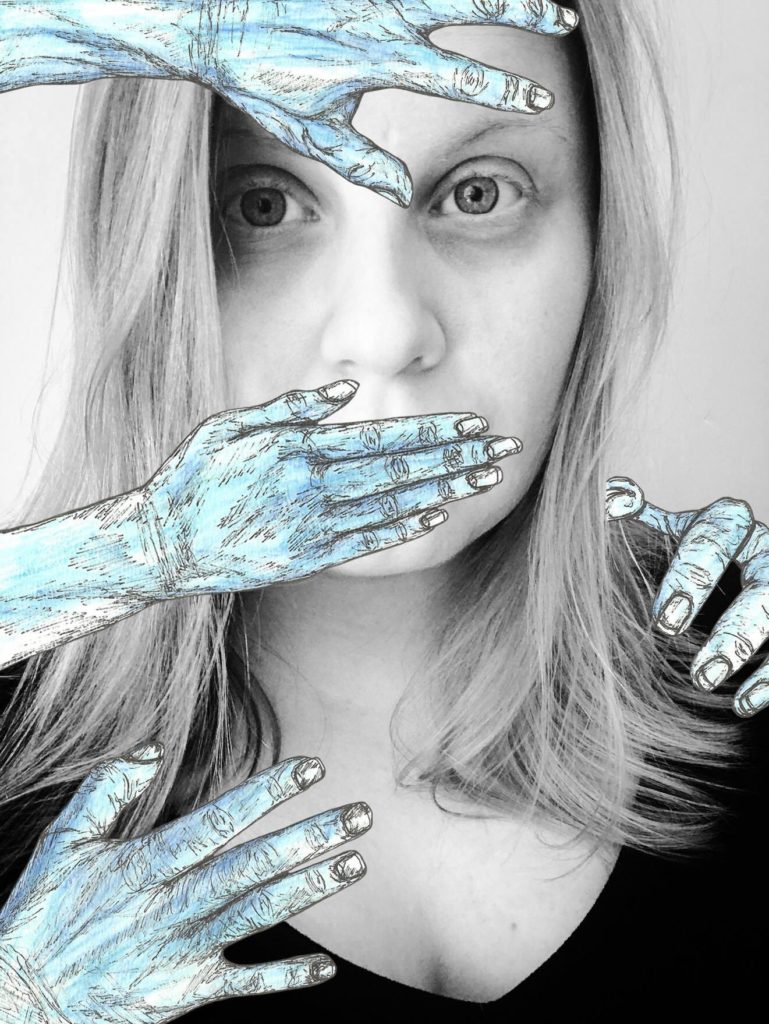
“I wish people understood that you only ever see us on our ‘good’ days. You don’t see what goes on behind closed doors. You don’t see the pain and suffering that ME causes to every aspect of your life.” ~ Amy Clark, 21, Dorset (she/her)
“I wish people knew that when I laugh, smile and joke around, it doesn’t mean I’m better or that my illness isn’t serious. It’s just how I cope with this situation and I won’t let this illness take away my humor.” ~ Rea, 27, Vienna (she/her)
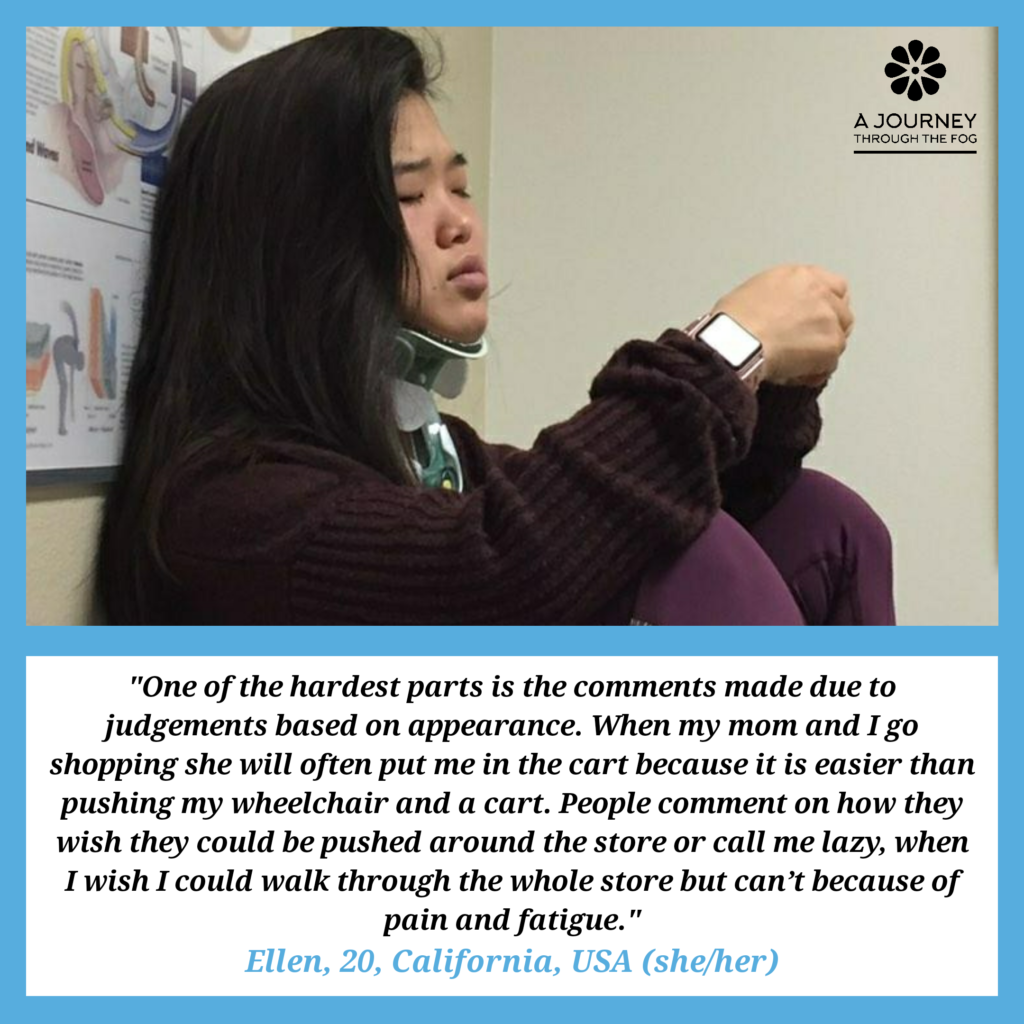
“One of the hardest parts is the comments made due to judgements based on appearance. When my mom and I go shopping she will often put me in the cart because it is easier than pushing my wheelchair and a cart. People comment on how they wish they could be pushed around the store or call me lazy, when I wish I could walk through the whole store but can’t because of pain and fatigue.” Ellen, 20, California (she/her)
“I wish people could understand the pain I go through, how much strength and willpower I have to use to keep some level of normality. They only see me when I’m well.” ~ Nat (30), Derby, UK (she/her)
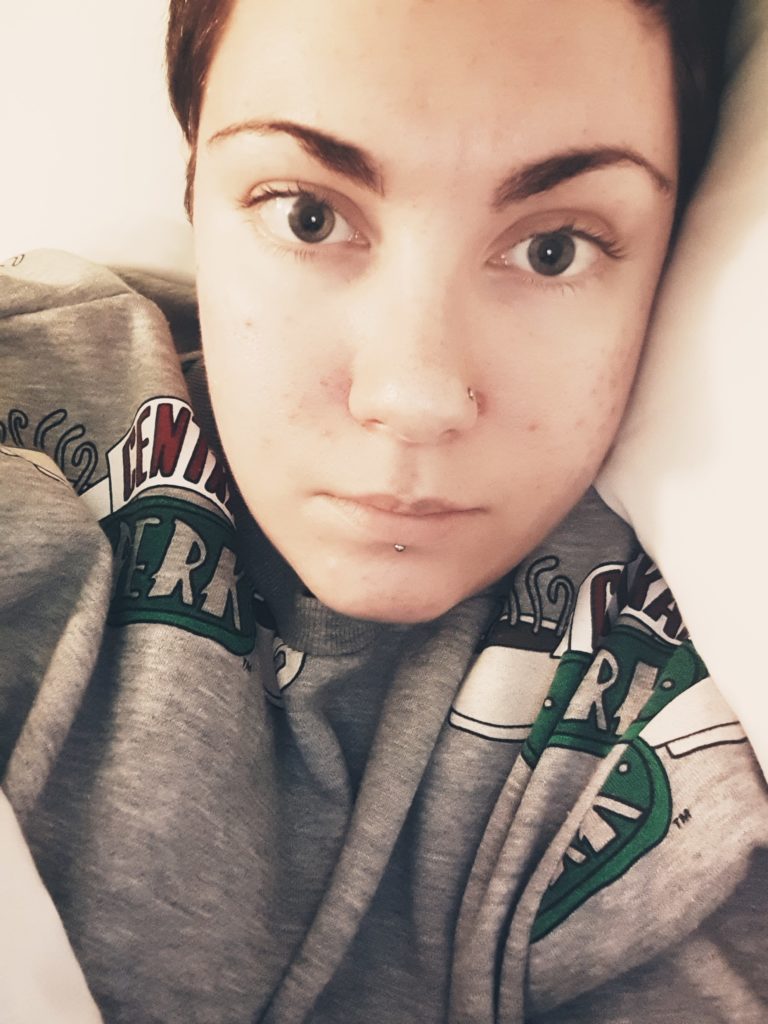
“Imagine a blood pressure cuff squeezing you from neck to waist, consciously forcing yourself to swallow and breathe, invisible sparks & jerks along your arms, main leg nerve blazing, feet pressed to hundreds of fine needles, and more – whilst suffering days in bed just because you cleaned the bathroom.” ~ Alix Boswell, 49, Bath, UK (she/her)
“I wish people knew how hard it is for people with ME to get social services, medical care, and disability accommodation. Systemic discrimination and ableism are destroying our health as much as the disease itself.” ~ Heidi Hayward, 41, Camano Island, WA, USA (she/her)
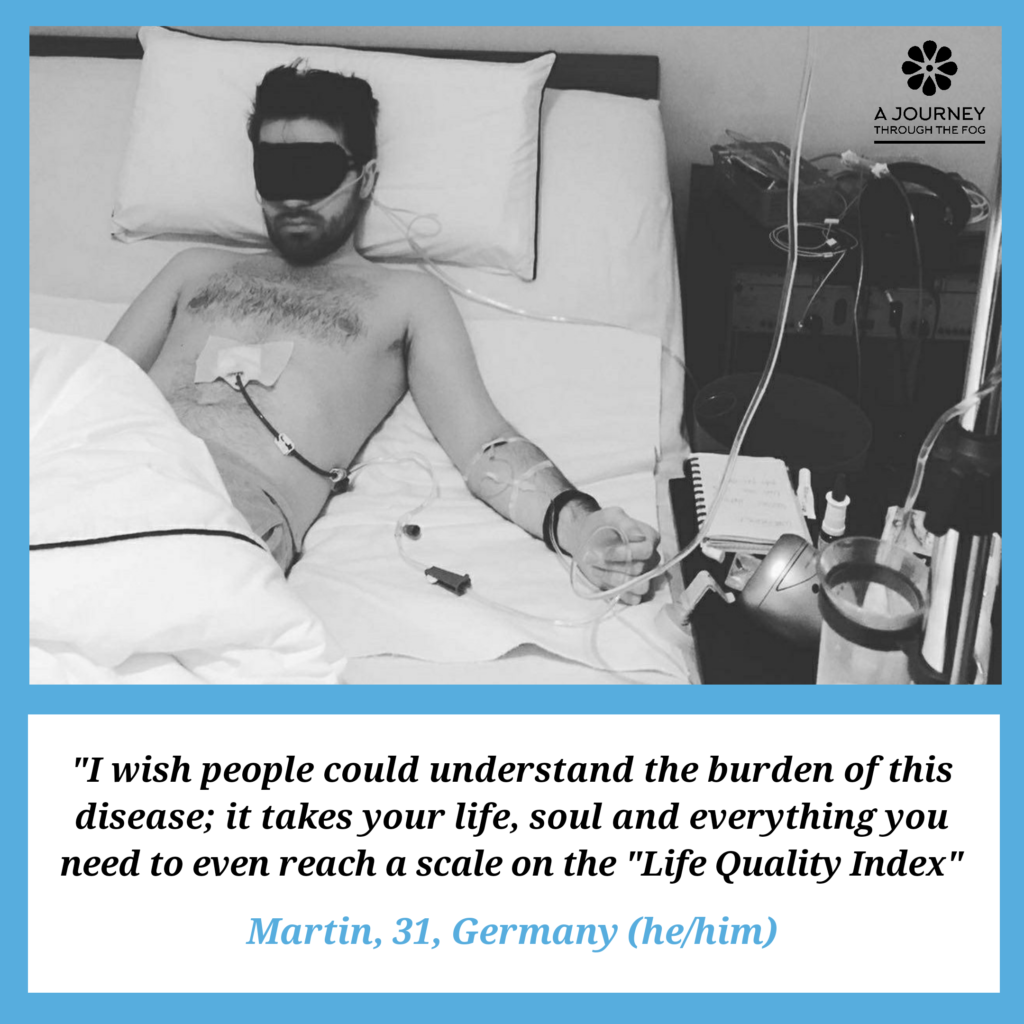
“I wish people could understand the burden of this disease; it takes your life, soul and everything you need to even reach a scale on the “Life Quality Index” ~ Martin, 31, Germany (he/him)
“You’re living in isolation in a glass bowl watching everyone do the things you want to do and be the person you used to be. ME is like dying, but still alive, and grieving who you used to be. Screaming: “I used to be useful like you” ~ Viv, 52, Nottingham, UK (she/her)
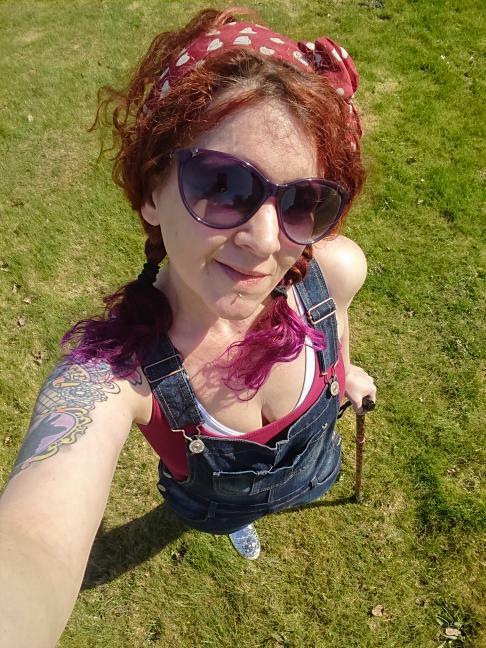
“I wish people knew how devastatingly life changing ME is not just for the person experiencing it but also for their partner and children (if they are lucky enough to have them) who take on the role of carer and how degrading and soul destroying that feels for the person with ME a mere shadow of their former self.” ~ Kerry Field, 37, Warwickshire, UK (she/her)
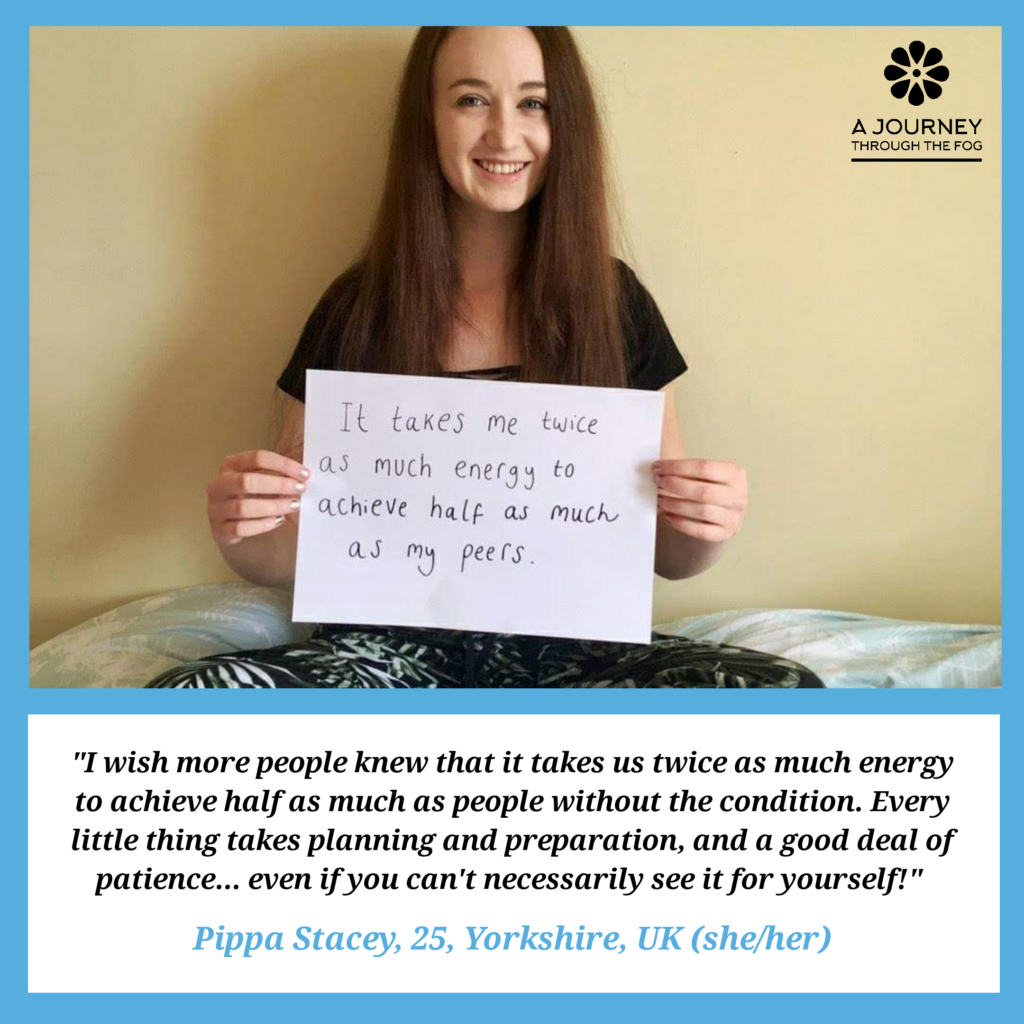
“I wish more people knew that it takes us twice as much energy to achieve half as much as people without the condition. Every little thing takes planning and preparation, and a good deal of patience… even if you can’t necessarily see it for yourself!” ~ Pippa Stacey (Life of Pippa Blog), 25, Yorkshire (she/her)
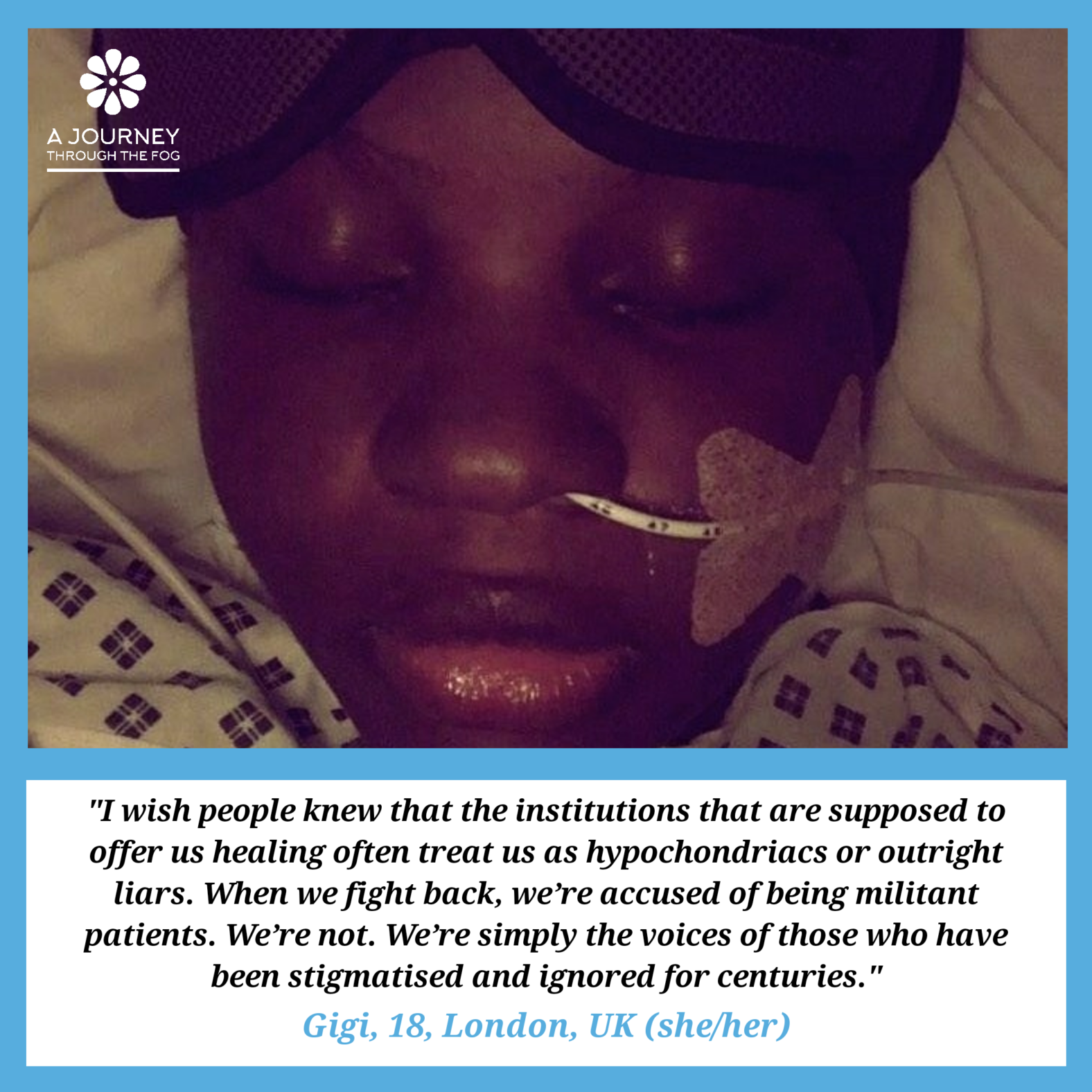
“I wish people knew that the institutions that are supposed to offer us healing often treat us as hypochondriacs or outright liars. When we fight back, we’re accused of being militant patients. We’re not. We’re simply the voices of those who have been stigmatised and ignored for centuries.” ~ Gigi, 18, London, UK (she/her)
“I wish people knew that ME affects every single aspect of my body and every second of every day. I never get a break from it. I wish people understood the incredible strength and resilience of the ME community. These people continue to advocate and support each other from their beds and I don’t know where I’d be without them!” ~ Whitney Fox, 31, Maryland, USA (she/her)
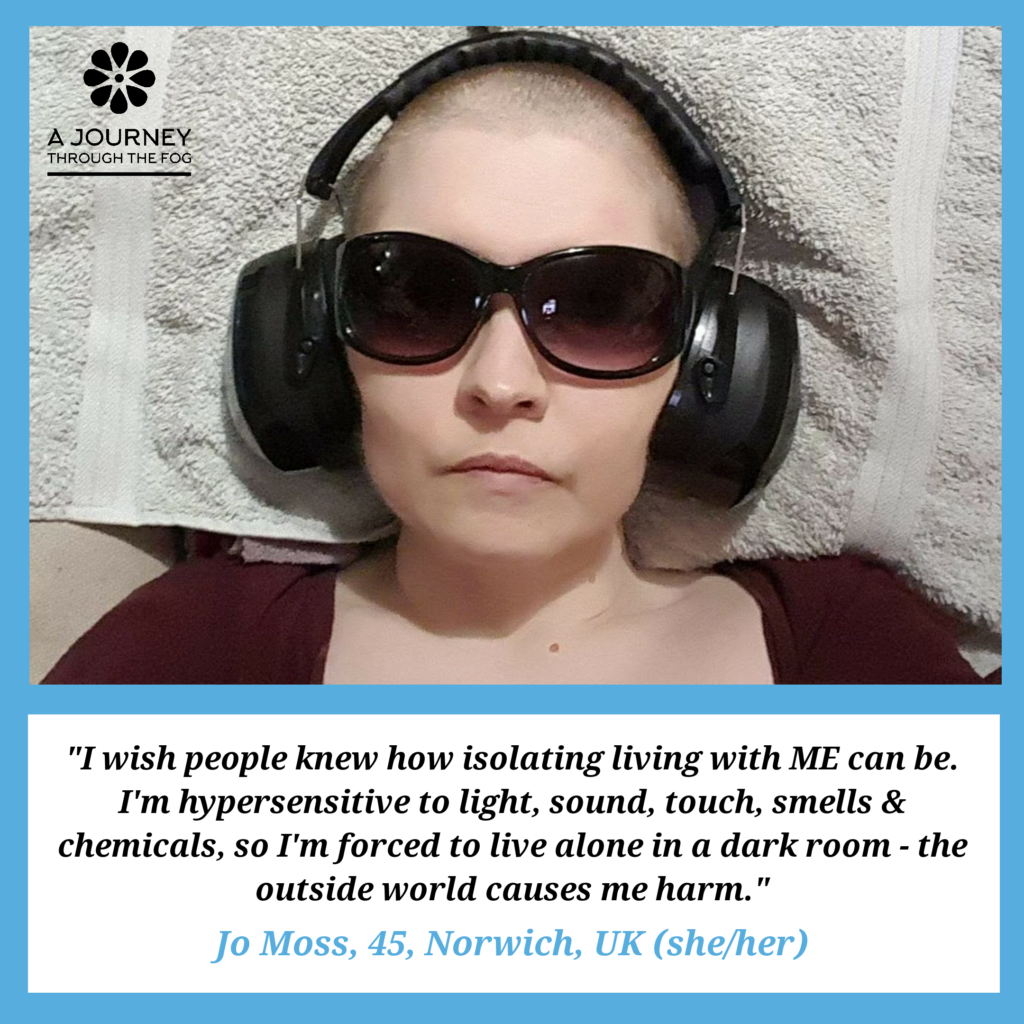
“I wish people knew how isolating living with ME can be. I’m hypersensitive to light, sound, touch, smells & chemicals, so I’m forced to live alone in a dark room – the outside world causes me harm.” ~ Jo Moss, 45, Norwich, UK (she/her)
“I wish people knew how much ME steals from us…careers, hobbies, friendships, independence, education, time with our children and family…our life is just put hold with no idea if or when things will get better.” ~ Chantelle, 33, Gloucester, UK (she/her)
“What I mostly wish people knew is that when they see me out in public, it’s not because I’ve recovered. I’m still sick, but may either be pushing myself knowing that I’ll crash afterwards, or I’m having a rare good day.” ~ Helen, 58, California
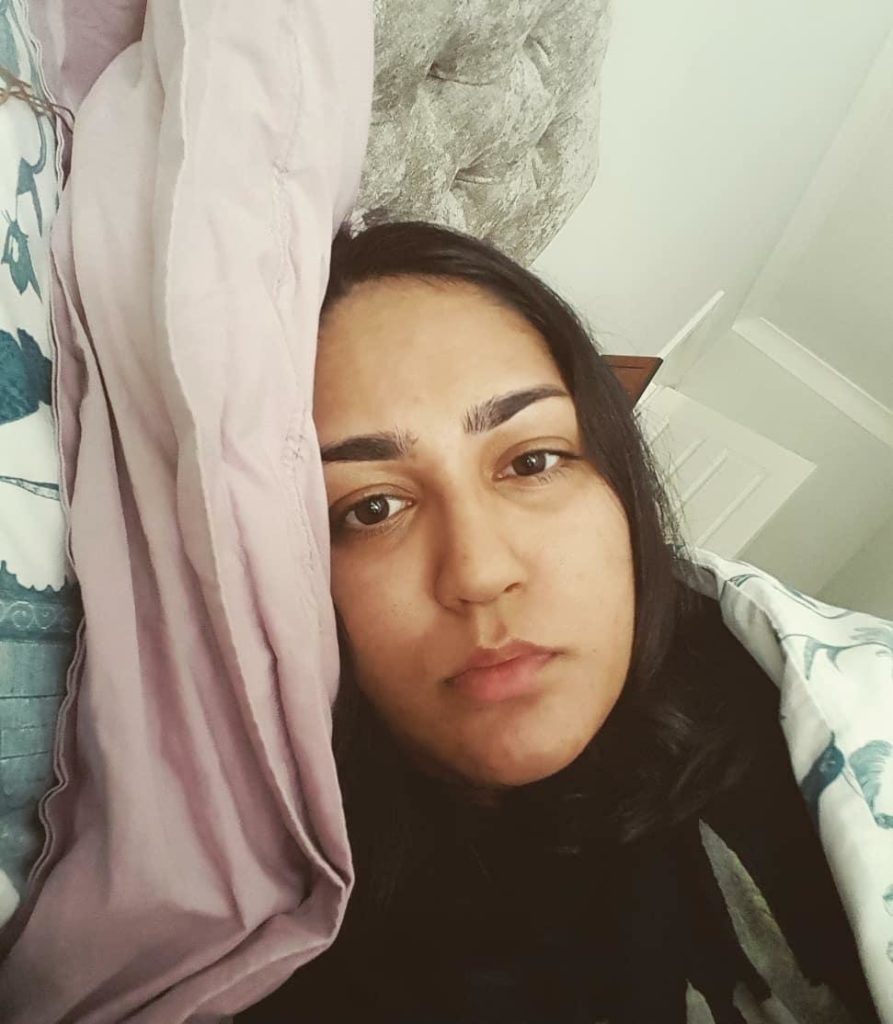
“I wish people knew that ME is a serious, debilitating, chronic disease that affects men, women, and children all over the world. ANY energy I expend, including mundane things such as: speaking, chewing food, or watching TV can cause a worsening of my symptoms. I can go from being capable of making a short visit out to later laying in pain unable to tolerate light or sound, incapable of moving or speaking.” ~ Heath, 47, Virginia, USA (he/him)
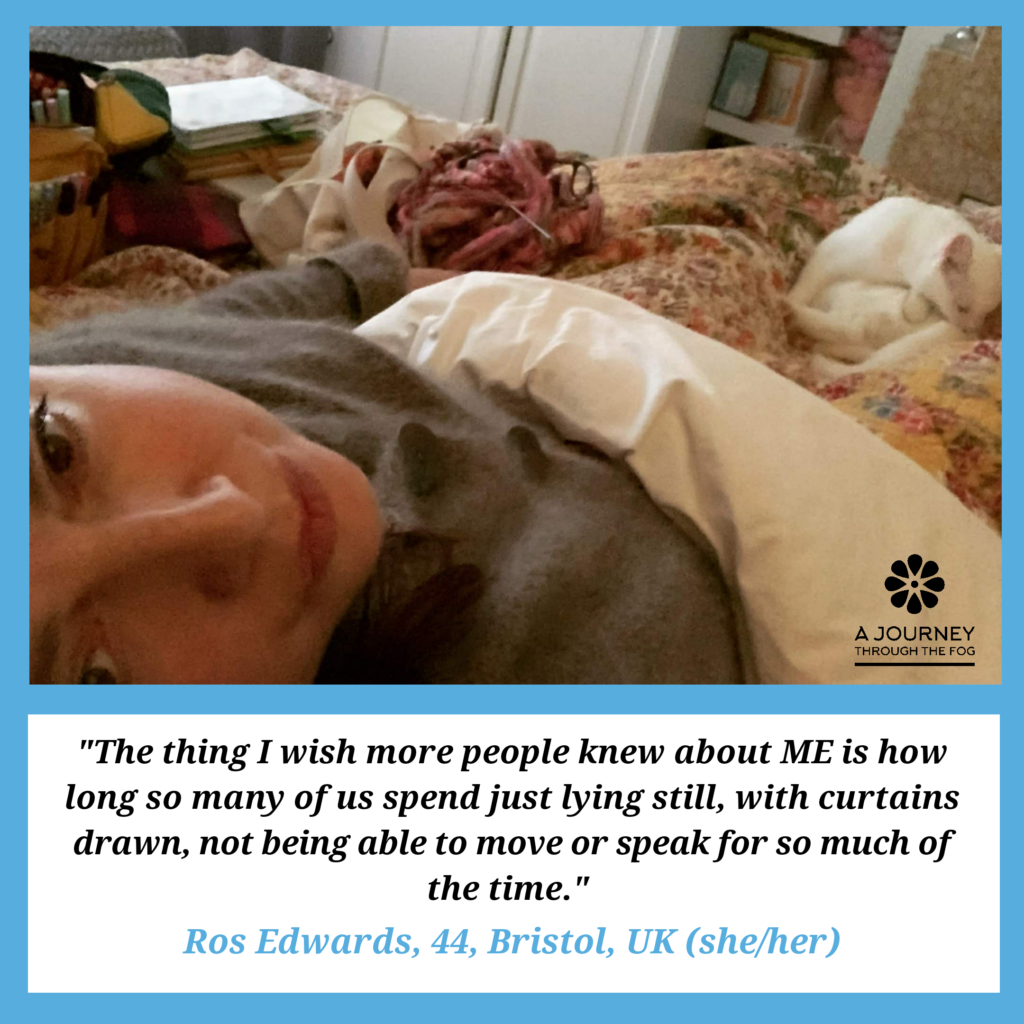
“The thing I wish more people knew about ME is how long so many of us spend just lying still, with curtains drawn, not being able to move or speak for so much of the time. That we have the will to do more – that inside we are impatient to be productive or be able to distract ourselves with crafting or journaling for example, but aren’t even able to sit up and do those things for much of the time.” ~ Ros Edwards, (44) Bristol, UK (she/her)
“I wish people understood how deeply we grieve our former lives. How much we want to return to: hanging out, doing our work, spontaneity. And that laying around all day is not: fun, relaxing, lucky. It is: boring, frustrating, agonizing.” Ariel, 50, Easthampton, Massachusetts, US (she/her)
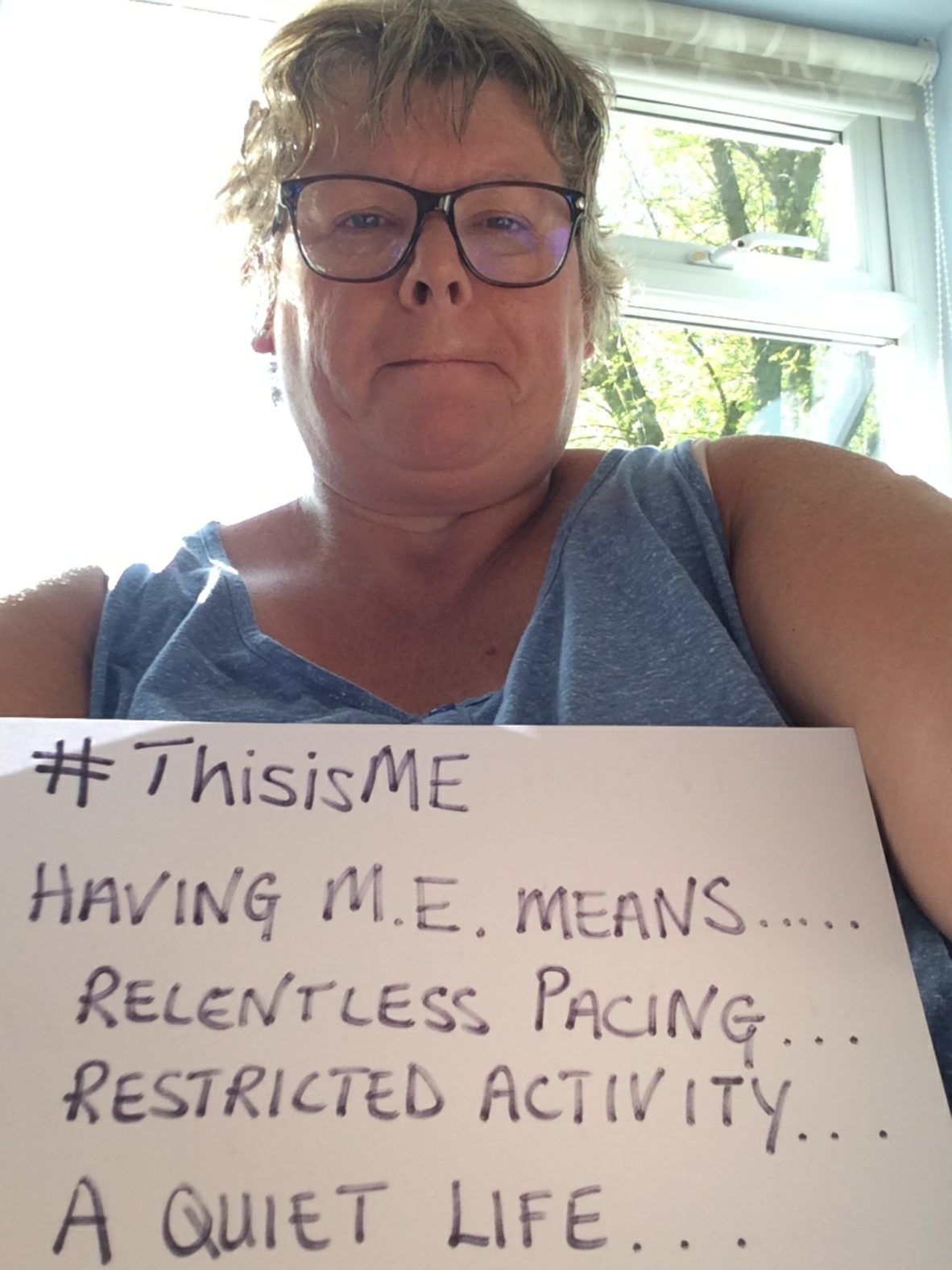
“My wish is that people would understand that the NHS in the UK doesn’t know much about ME/CFS and that GP’s mainly haven’t heard of it and don’t want to deal with people who have it.” ~ Kate Brookson, 38, UK (she/her)
“I wish people knew just how much ME strips you of your autonomy.” ~ Lauren, 21, Sheffield, UK (she/her)
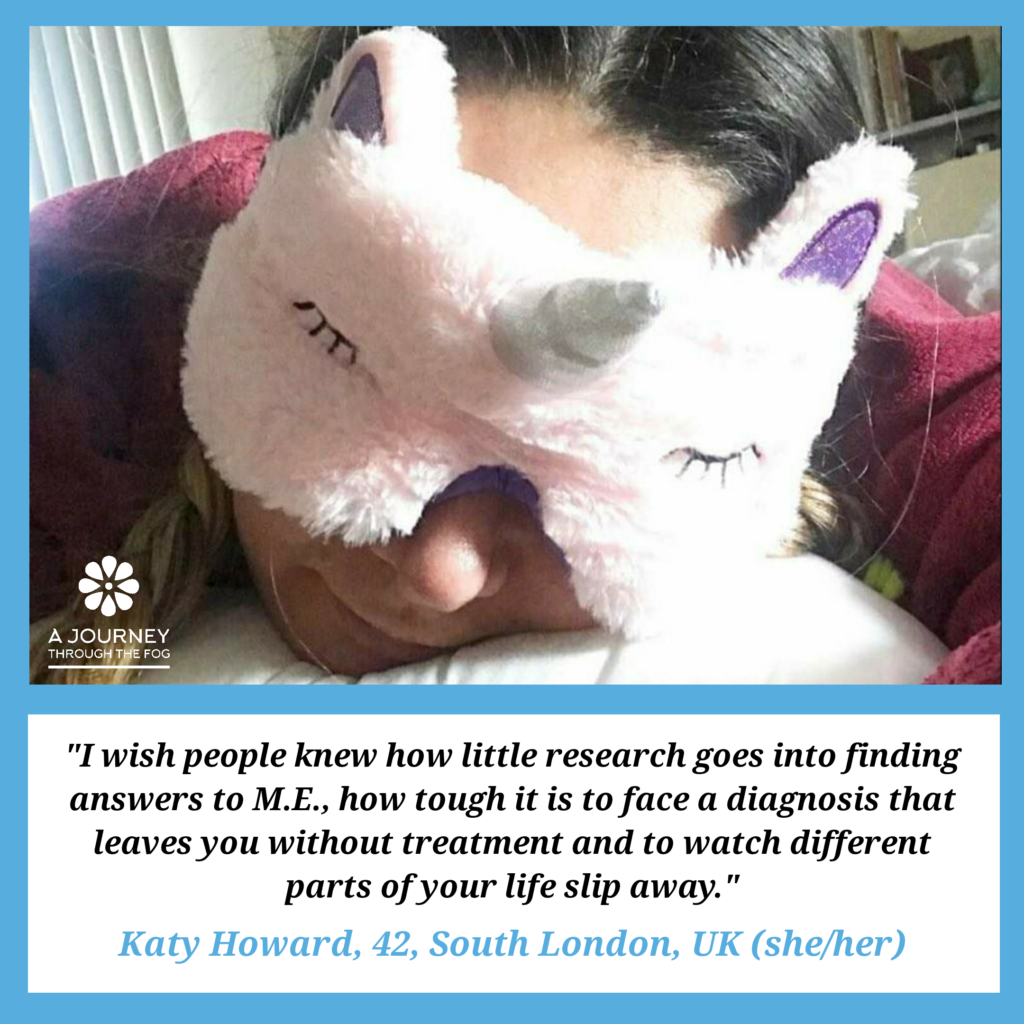
“I wish people knew how little research goes into finding answers to M.E., how tough it is to face a diagnosis that leaves you without treatment and to watch different parts of your life slip away.” ~ Katy Howard, 42, South London (she/her)
“I wish people understood how hard it is even to get up in the morning. How exhausting it is simply getting washed and dressed. I wish they could grasp that I can’t just push through it and carry on. That they could understand what it is like to be in constant pain from one part of my body or another. And I wish they’d understand how much it constricts your life and how alone it makes you feel.” ~ John, 32, Norwich, UK (he/him)
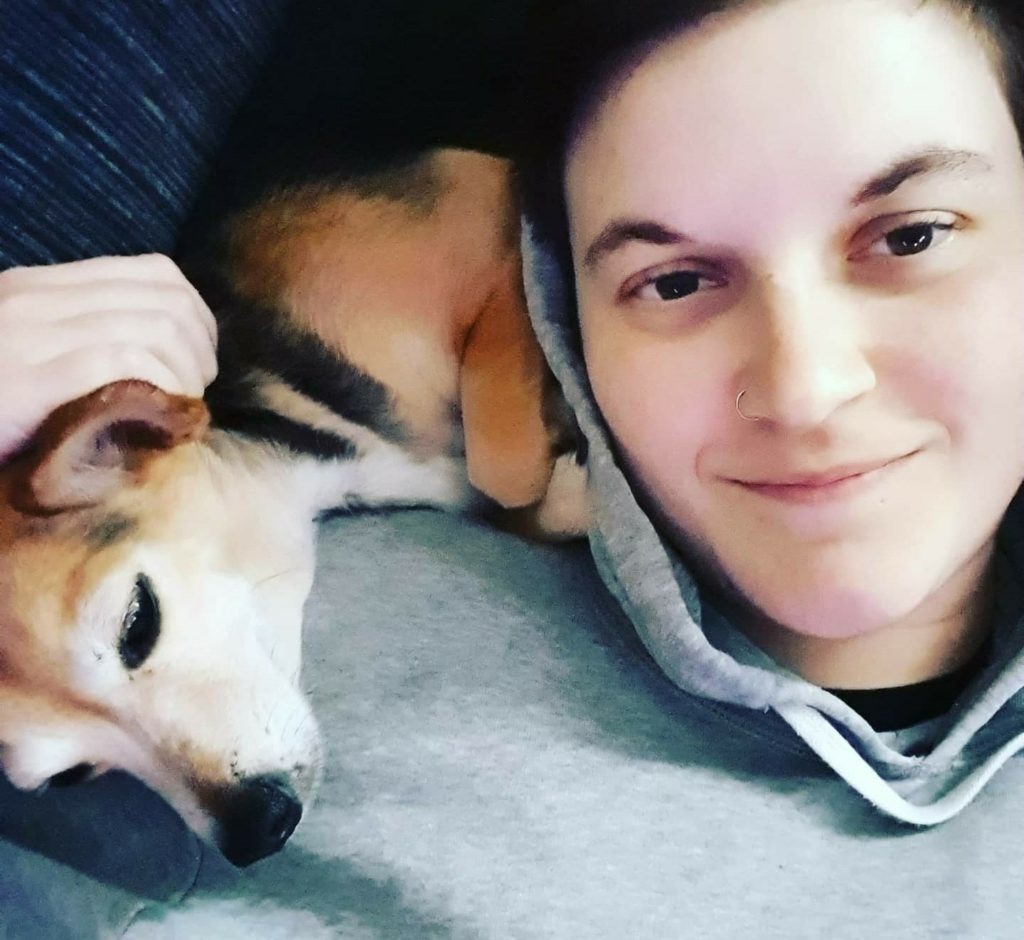
“I wish people knew how daunting it is to get an ME diagnosis – a diagnosis which not only means chronic as in “life-long“, but also a diagnosis that many doctors have never heard of, don’t know how to treat and often disbelieve its existence. How abandoned you feel when there is no medical professional to help you cope with pain or symptoms.” How much pressure it puts on a chronic illness patient to research and manage their medical condition all by themselves.” ~ Nina, 33, Berlin, Germany (she/her)
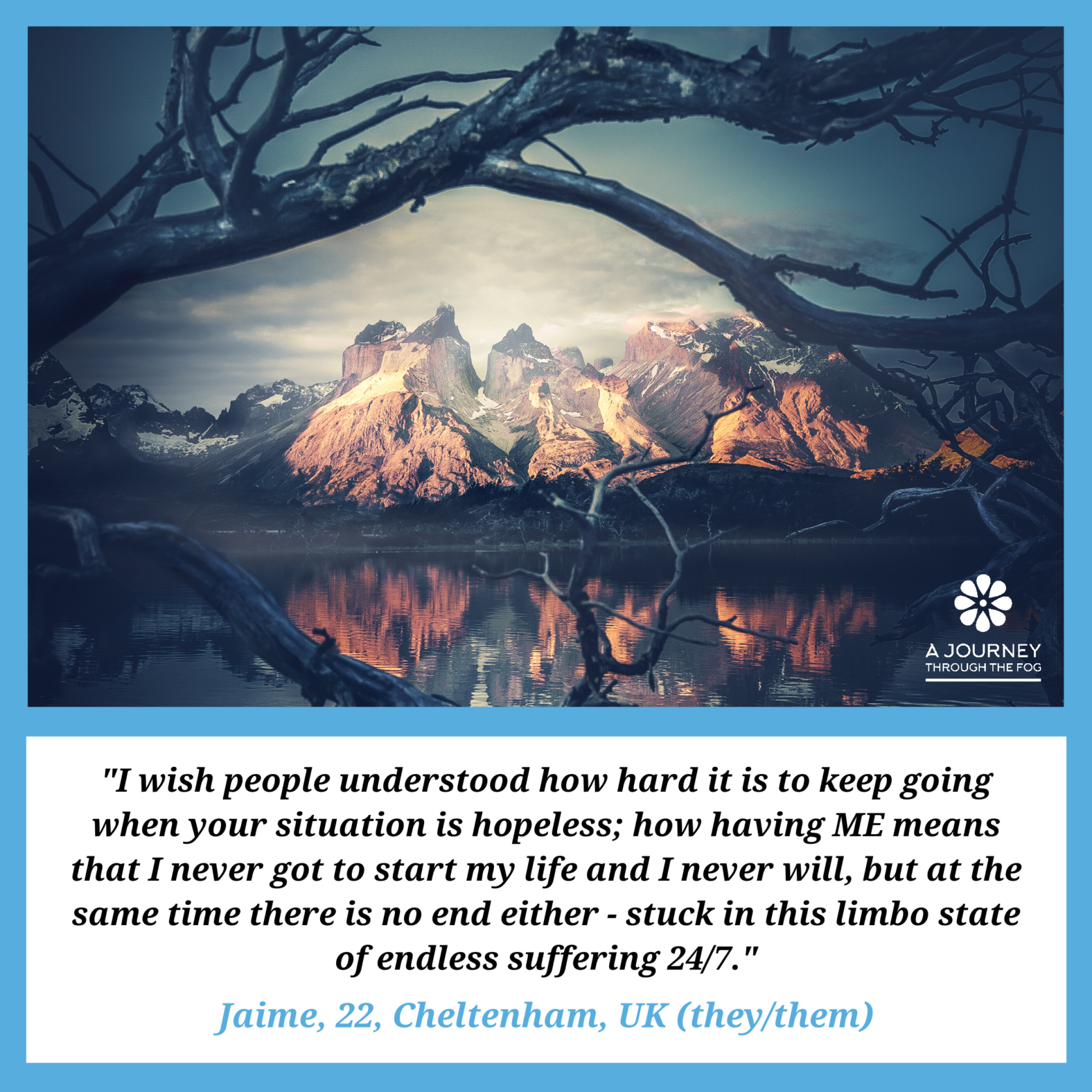
“I wish people understood how hard it is to keep going when your situation is hopeless; how having ME means that I never got to start my life and I never will, but at the same time there is no end either – stuck in this limbo state of endless suffering 24/7.” ~ Jaime, 22, Cheltenham, UK (they/them)
“I wish people knew ME is not “just being tired”. There are dozens of symptoms. I deal with crippling exhaustion, nerve pain, body pain 24/7, headaches, noise and light sensitivity, back pain, to name but a few. I’ve gone from being a figure skating coach and ex athlete to this.” ~ Linda, 49, Scotland, (she/her)
A huge thank you again to everyone who sent me their #MEwishes.
If you would like to support my advocacy work, you can here. Thank you.
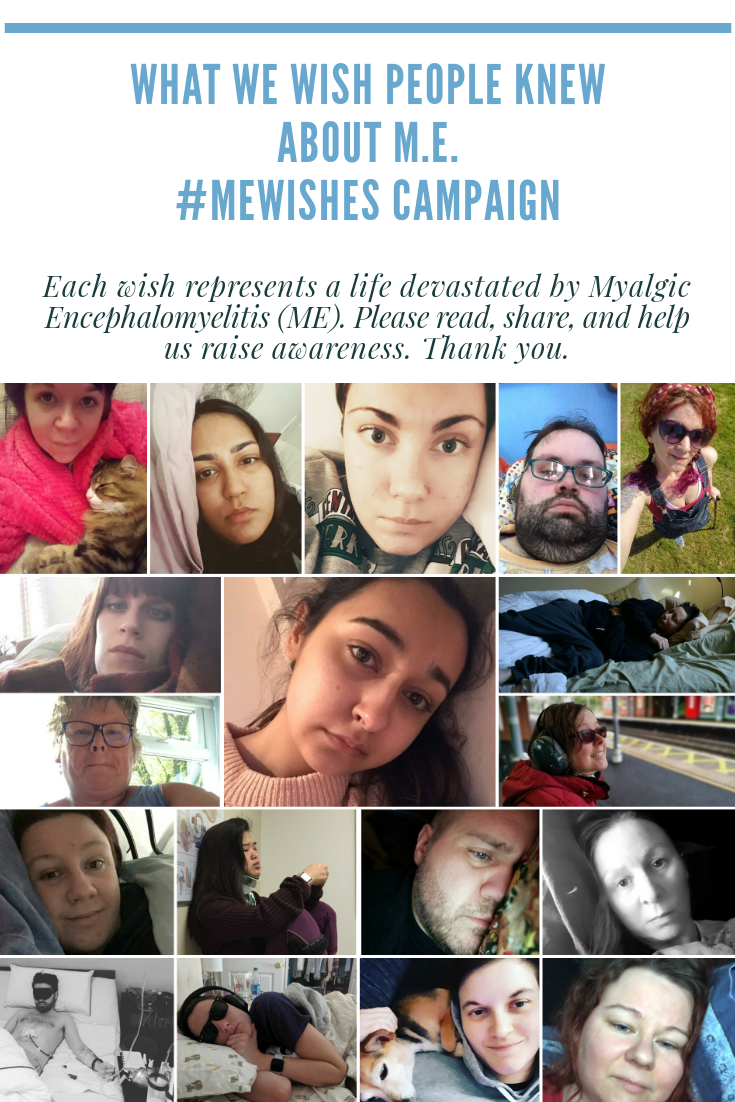

Such an informative post! Thanks Jo
Thank you Jenna. This post was an absolute pleasure to compile. I got to speak to so many lovely people from the ME community. I hope you are able to join me on social media for ME Awareness week – I will be sharing all 50 #MEWishes.
Hi Jo
Is it possible to get a ME wishes poster or is it too late now?
Many thanks
Hi Donna. If you can get your quote to me by the end of today I will find the time to make your wish for you. I will also need your name, age, location and photo. Thank you.
Please email it to Jo at: ajourneythroughthefog@googlemail.com
The many beautiful faces and of this misunderstood disease. Thank you for participating and thanks for putting this together, Jo.
Well done Jo on this fabulous post, prior to my MS diagnosis I was sent to the CFS clinic and the difference between the two though a lot of the time is not much at all, just when I was diagnosed with MS I seemed I was understood more, I really hope they find a breakthrough to at least see where it is coming from….take care of you while you are doing this xx
This is incredible, Jo. Made me a bit teary both from sadness and the sense of ‘hell yeah’ for all these amazing people sharing their stories. These things, the things we deal with day in and day out that others don’t see and can’t grasp, can be overwhelming. Bringing ME life to the greater social consciousness, even just a little, is so important. Bravo!
Such an effective way to raise awareness of what ME is and more importantly, how it affects ME warriors. I see so much of my own life in these comments, not that I didn’t know we shared similar life changing symptoms but it’s just staring me in the face here. I don’t know if having a named rare disease is easier for others to understand. I do know that I’m very lucky to have a GP who has learnt about my condition! I hope that this campaign raises awareness for all of you and all my friends who live with this condition. I’ll be sharing this on all my social media.
Great idea, Jo! Thank you for providing a way for people with ME to participate from our beds. Really appreciate it!
Thank you Jo Moss , this is a fantastic way to raise awareness. I wish people knew how strong we really are and if they only new the people we were before being hit with this horrendous disease . Its absolutely soul destroying. Thank you to all that took part in this . Thank you Jo xx 💙
Thank you Lorraine 💙 There’s still time to add you wish to the campaign if you would like. I just need your name and location, and photo if you would like to include one.
This is an eye-opener for non-ME sufferers. I hope your campaign really helps to bring awareness. Fantastic work.
Somebody has forwarded me the 80 ME Wishes because of my interest in sufferers and the subject. I don’t use any of the social media platforms so I otherwise wouldn’t have come across these very real accounts of what it is like to live with ME. I am not someone who has personal experience of ME, but as a Human Givens Psychological Therapist I work and have worked with a number of clients who are sufferers. This isn’t because I support the belief that ME’s origins and/or symptoms are rooted in psychologically. People suffering with ME have more than their fair share of challenges in life to cope with so why wouldn’t they, like other members of the general population, have emotional challenges and clutter to deal with? Managing life and the physical symptoms of ME leaves people more vulnerable to depression, trauma, anger, anxiety, heightened sensitivity, addiction, obsessive compulsive disorders, paranoia, distorted thinking, isolation, grieving and aloneness while they battle, often unsupported and not understood, to get at least some of their basic human needs met, something we all have to do if we are to survive well.
What a huge task, but with people like yourselves who have and haven’t contributed to the Wishes, educating people can significantly help. I appreciate the endless task of educating people requires energy that people experiencing ME do not have, but ME Wishes are excellent impact statements, well done! Use them wherever you can over and over again to get the message out there.
In 2012 following blood cancer and chemotherapy treatment I wrote an article which was published in the Human Givens Journal and from it I quote:
“In spite of fatigue I was restless and my sleep was poor, as it is for many people suffering with ME/CFS, but the big difference for me was I knew it would end when my treatment finished………..”
Recently I had an interesting conversation with a client who has ME about the origin of ME as well as whether, with greater understanding, it could be prevented? It followed on from a discussion regarding the current world wide COVID-19 virus and whether following this epidemic we are likely to see a considerable increase in ME given that ME commonly follows a viral infection. What might we learn from this huge experience of dealing with an unknown virus? This lead me to question whether my approach to illness and recovery, which is to physically work and push through it to rebuild strength and fitness (not listening to my body) could leave me vulnerable to ME if I was to adopt that approach when recovering from a viral infection?
You all do such a good job of managing your illness because you have no choice, there is limited knowledge about ME and scant medical services, particularly in secondary care, in England. The down side to this is that costs and demands on the NHS are relatively insignificant consequently ME doesn’t have the same political clout. Wouldn’t it be good if some PhD students did some research across the board, causes, quality of life, management, prevention and all costs, including benefits etc., as well as Social/Health care and for some politicians to be on board, or may be that is starting to happen already? Once the pandemic is being better managed more interest may be stimulated and perhaps attract some funding on the back of COVID-19?
Val
Val Giblett BSc.(Hons) HG Dip.P MHGI
Human Givens Practitioner & Supervisor
Telephone: (01263) 732784
Mobile: 07751959145
Email: val@humangivenstherapist.co.uk
Website: http://www.hgi.org.uk
N.B. Val worked for many years in mental health rehabilitation and her interest goes
back to visiting long stay wards at Thorpe St. Andrew’s and Hellesdon psychiatric
hospitals in Norfolk in the 1950s. For the last 18 years she has been a Human Givens
Practitioner in Norfolk, England.
I do not have ME but I too suffer from chronic pain that doctors do not know how to diagnose. I had a hysterectomy that cut and nicked my ureter. I went into kidney failure before having a corrective surgery. I had a ureter reimplantation with a biori flap. My ureter was so damaged that the doctor had to rebuild my bladder up my right side and hitch it to the psoas. The psoas is the number one stabilizing muscle of the body. It pretty much is activated every time you move anything from the hips upward. The weight of an organ hanging off the front of this muscle and my kidney hanging off the back constantly pulls my back out of alignment. I suffer daily with pain that seems more than I can bare some days. I used to run 7 miles a day a few years ago. Tonight I was walking on the treadmill for 30 minutes at 3 mph. As I was doing this I was crying from pain. How did my body get here? Why am I daily trying to justify that I hurt from the moment my eyes open until I go to sleep? Then I came across this post about the pain you all go through. I was reminded I am not alone. I need to find the courage to keep fighting just as each of you must do. Thank you for sharing your stories.
Thank you. From the bottom of my heart. You have printed the words I couldn’t find to say. Thank you.